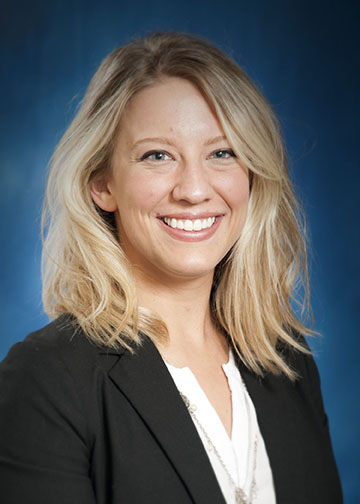
Profiles in Leadership

Maria C. Moore
Administrative & Communications Coordinator for the Office of the President
1. What is your name and profession?
Maria Moore
Administrative and Communications Coordinator
Office of the President
2. What does Women’s History Month mean to you?
To me, Women’s History Month is an opportunity to reflect not only on women’s professional contributions throughout the years, but also on the ways in which we can support women in their daily lives. Women’s History Month is a platform for conversations on empowerment and equity; many of the women we celebrate during this month achieved incredible things, often despite societal restraints or expectations. Today, we can use this month (and always) to advocate for ways to remove the hurdles the women before us faced.
3. As a woman, in what ways have you struggled to get to where you are today and how did you overcome those struggles?
I think balancing that sense of expected “femininity” and necessary toughness can be a struggle. Probably any woman could talk to you about a time when their toughness was perceived as bossiness (or worse) or a time when simply identifying as a female came with assumed weaknesses. I used to care more about how people viewed me, but once I realized that I’m not doing anyone any favors by being less than myself, I started to just wear my way of being with pride. How people perceive me, especially without really knowing me, is not my responsibility.
4. What advice do you have for young women who are aspiring to follow their dreams?
This year, I started to name my aspirations as facts. Basically, I didn’t give myself an alternative and started saying “I will” instead of “I hope.” You really can do — and succeed at — anything you want. Starting a podcast, a business, landing a dream job, getting into a competitive graduate program — whatever it might be, with persistence, is achievable. The important thing is to ask yourself often (and answer honestly): “What do I want?” As women, we feel some pressure to make decisions in reference to other people and wonder how our choices will impact others. This is a great quality only as long as it doesn’t undermine our own joy and sense of purpose.
5. As a woman in your position, how have you fought for equity in the workplace and for other women?
I’m a learner, so in each professional position I’ve held I’ve been intentional about adding bits of knowledge on equity and inclusion to my “brain space” – kind of like arrows in a quiver. I make this comparison, because wisdom is one of the greatest weapons against inequity; the more you know, the better able you are to fight and win. I’ve spent time “soaking in” data around equity in compensation and position, not just in higher education, but in other industries as well and tried to determine why certain inequities exist. I can use this information to be a thoughtful advocate for myself and others and, hopefully, spur real change.
6. Who was your role model and how did they change your life?
One of my biggest female role models is my mom. My mom was the first person to show me that anything is possible, and that there isn’t a time limit on achievement. My mom was a nurse when I was young, but throughout my most formative years, I saw my mom earn both her master’s degree and PhD. She earned her PhD from the University of Michigan in her early 50s, and during those years of study, she balanced childcare, responsibilities at home and a rigorous research schedule. Plus, she looked after her aging parents. Watching my mom achieve so much in addition to the demands of every day life was inspiring then and is inspiring now. I am so grateful for her example.
7. What is your hope for the next generation of women and girls?
My hope for the next generation is that they are encouraged throughout their lives to do exactly what they want to do without judgement and that they are afforded the autonomy they deserve separate from expectations of how they “should be.” I also hope that they will have many examples of how they can support one another and understand that another woman’s win is not their loss.

